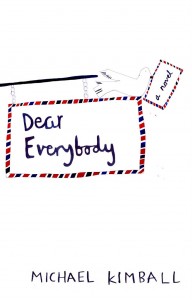
 This week I’m interviewing Michael Kimball as part of his blog tour for Dear Everybody, a novel with a fascinating structure. I’m not actually going to talk much about the novel, because Michael’s answers to my questions illuminate so much of the work, and the way that he created it, that I don’t think you need much of a overview from me, other than to say that if you’ve ever thought that you couldn’t be gripped by a novel whose ending is clear from the first page, think again. One of the pleasures of this novel is filling in the gaps that lead you from knowing the end, to understanding it, and it’s a very satisfying, if sometimes melancholy, experience.
This week I’m interviewing Michael Kimball as part of his blog tour for Dear Everybody, a novel with a fascinating structure. I’m not actually going to talk much about the novel, because Michael’s answers to my questions illuminate so much of the work, and the way that he created it, that I don’t think you need much of a overview from me, other than to say that if you’ve ever thought that you couldn’t be gripped by a novel whose ending is clear from the first page, think again. One of the pleasures of this novel is filling in the gaps that lead you from knowing the end, to understanding it, and it’s a very satisfying, if sometimes melancholy, experience.
When I thought about what I wanted to ask Michael, the structure of the novel loomed very large in my mind, and so I started with that question.
Epistolary novels are a fairly old form, but you’ve given this idea of a story told in documents a very new twist, in part because there is no surprise at the end here – we already know that Jonathon Bender died by his own hand, and that his brother, Robert, is attempting to piece together Jonathon’s life by means of documents left behind. Why did you choose this structure for such a bittersweet narrative?
The beginning point was accidental. Dear Everybody started with one short letter, a man apologizing to a woman for standing her up on a date; the man is wondering if they had gone out that night, if maybe his whole life would have been different, better. At first, I didn’t know then who was speaking or that it was a suicide letter, but I did have a strong voice and a skewed way of thinking. That one letter led to hundreds of short letters—Jonathon, apologizing to nearly everybody he has ever known. After that, I added the obituary, the eulogy, and the last will and testament. After adding those framing elements, the novel opened up for me in a new way. I realized that I could include anything. I added the mother’s diary entries, conversations with people from Jonathon’s past, the psychological evaluations, encyclopedia entries, weather reports, yearbook quotes, to-do lists, a mixtape, and other sorts of documents that fill in the parts of Jonathon’s life that he can’t tell us with his letters. Writing a novel made up of 349 short pieces allowed me to deal with difficult material – abuse, mental illness, suicide – that might have become sentimental if handled as traditional narrative. And that also allowed me to put huge amounts of story into the novel. Each little piece is its own story.
There’s another narrative monolith lurking behind Dear Everybody, because there’s also a sense in which you’ve written the antithesis of the Great American Novel. Jonathon’s unwanted birth and his family’s move from California to Michigan begin a series of diminutions in which his life, world and opportunities get ever smaller and more constrained. How deliberate was your focus on the intrinsic value of smallness and failure as opposed to bigness and success, as subjects of fiction?
It was pretty deliberate. I recognized that particular way of thinking in the first letter I wrote—a desire for something else that is not possible, always finding failure in whatever is happening (whether it is a failure or not). Psychologists call it a negative affect and that thought very much animated the writing of Dear Everybody. It is anti- both in the sense of things not turning and also in the way it is told, the non-traditional narrative.
We get to know Jonathon entirely through his relationships with others, although Robert, his brother, actively rejects some of Jonathon’s experience and even censors a letter in which Jonathon has said something about their father that Robert cannot accept. The reader has to guess what to put in the gaps between the letters – to what extent are you happy that a reader might find a very different view of Jonathon to your own?
I’m OK with different readers having different views of Jonathon. It was a risk I had to take when I decided to write the novel that way, with all the different kinds of documents (and it is part of the function of the other documents that aren’t letters, to fill in those gaps). This way of telling the story is also one of the reasons the novel can cover so much ground, tell so much story through implication and accumulation. And that particular passage, those blacked out lines –my feeling was that spelling it out would have lessened the emotional power and narrative complexity of the novel.
You’re very involved in the world of micro-fiction and the condensing of life experience into tiny formats. What is it that appeals to you so much about very short fiction?
I am fascinated by implication, by how much story can be conveyed in how few words. I think writers owe that to readers—to give them as heightened an experience as they possible can.
Tom Bender, the father, is a ghastly character – he has no redeeming features at all! Do you see him as a genuine monster or as a version of a certain kind of masculinity at a certain period of history – in other words, is he unique or could some aspect of him be lurking in many men?
It’s kind of sad to say, but he is a somewhat torqued up version of my father and the fathers of many of my friends—a conglomeration of the worst.
And I always ask this: if you were abandoned on a desert island, with just one book for company, what would it be?
Just one book is tough, but I’m going to go with Daniel Schreber’s Memoirs of My Nervous Illness – for the way Schreber’s mind unfolds and unfolds in irresolvable ways.
I hope that I’ve managed to fill in some of the gaps, and illuminate some of the ‘implications’ that Michael uses so effectively to tell one life, in letters and documents, and turn it into a sweet and melancholy meditation on why people may end their lives, and what that does to those they leave behind.


1 Comment
jem
13th May 2009I read a lot about this book recently. And then I read it. And it’s every bit as good as everything I read about it.
One of my top books of this year, easily!
I liked what Michael said about heightening the experience for the reader and allowing us to draw our own conclusions about the censored bits. I felt very connected with Jonathon despite knowing he was fictional, because I felt I was only seeing parts of him, just like I would if I met someone. It’s a flawed and distorted view with a large dose of my own interpretation but very genuine for that.
Thanks for the interview.